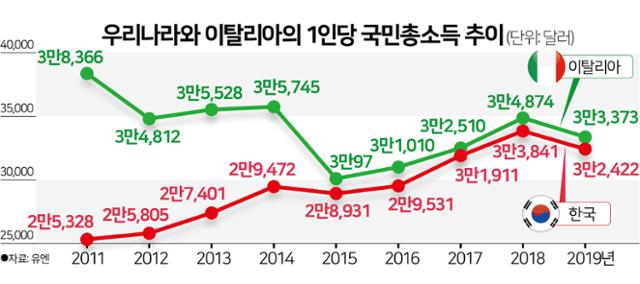
On the afternoon of the 4th, the Namdaemun Market in Seoul is busy. Last year, which was hit by Corona 19, Korea’s gross national income (GNI) per capita remained at the $30,000 level, but remained at $31,755, which fell for the second consecutive year. News 1
Korea’s gross national income per capita (GNI), which was likely to “win and win,” after surpassing $30,000 for the first time in 2017, has been stepping back for two consecutive years. The corona crisis caused the economy to grow negatively, and the exchange rate also rose (devaluation of the won).
However, there is a growing expectation that Korea can rise to the ranks of the G7 (7 major countries) based on income in the future, while the economic growth rate does not deteriorate significantly compared to other countries based on the recovery of export and manufacturing industries. Italy’s GNI, the youngest of the G7 who is heavily dependent on the tourism industry, declined 7% year-on-year.
GNI per capita $31,755… Decrease in the second year
According to the ‘2020 National Income’ released by the Bank of Korea on the 4th, the GNI per capita last year reached 3,7473,000 won, an increase of 0.1% from the previous year. GNI refers to the income earned by all citizens at home and abroad for one year, and the GNI per capita divided by the number of people is an indicator of the average income level of the citizens.
The dollar-denominated GNI per capita, mainly used for comparison with other countries, was $31,755, down 1.1% year-on-year. It kept the 30,000 dollar mark, but it has declined for the second year in a row from the previous year. The annual average won-dollar exchange rate rose 1.2% from 2019 (1,166 won) to 1,180 won. This is because the won-dollar exchange rate soared to the late 1,200 won range due to the Corona 19 shock in the first half of last year, raising the average exchange rate.
The decline in dollar-denominated GNI per capita for the second consecutive year was the third time since the 1997-1998 financial crisis and the 2008-2009 global economic crisis. It was a crisis situation that had a major impact on the economy, and it was also a time when the exchange rate skyrocketed. However, this decline is in the -5.4% level, which is relatively modest compared to the previous two declines, which recorded -38.7% and -20.4%, respectively.
“The three factors that make up the dollar-denominated GNI per capita are the real GDP growth rate, the GDP deflator, and the exchange rate.” It was analyzed that it recorded negative growth (-1%) and that per capita national income decreased as the exchange rate rose.”
Can the’G7′ settle after defeating Italy?

The trend of gross national income per capita in Korea and Italy. Graphic = Reporter Moon Joong Kim
The government had an optimistic outlook last year that Korea’s per capita GNI will be able to enter the G7 ranks for the first time. It is believed that it can overtake Italy, the role of G7’s’youngest’. The G7 includes the United States, Japan, Germany, the United Kingdom, France, Canada and Italy.
In fact, the difference in GNI per capita between Italy and Korea, which was more than $10,000 in 2011, has sharply decreased from 2015, and narrowed to just $951 in 2019. Unlike Korea, which has a large manufacturing industry last year,’defenses’ the growth rate at the level of -1%, Italy, which is centered on the tourism industry, which was hit hardest by Corona 19, also accepted a disastrous report of -8.9% growth from the previous year. The expectation that per capita GNI will be able to overtake Italy is not without grounds.
However, the BOK’s position is that it is difficult to predict a hasty comparative advantage as each country must convert the figures published in their own currency in their own currency and compare them on the same basis. “A few days ago, Italy announced the GNI per capita last year, and it was found to have decreased by 7% compared to the previous year in terms of euros.” “It is difficult to know exactly (whether our country has surpassed Italy) until officially announced by international organizations such as the IMF), the Organization for Economic Cooperation and Development (OECD) and the World Bank (WB).”
If last year’s GNI per capita in Korea exceeded Italy’s, would we be able to say that we have reached the G7 level stably? Director Shin said, “Corona 19 situation is a big variable, and it is inevitably influenced by each country’s response method and industry type, so it cannot be predicted at this time.” “This shock is a new area that has not been experienced in the past, As in the past, we have to watch the situation if the economy can rebound right after a year.”
Kwak Joo-hyun reporter [email protected]
News directly edited by the Hankook Ilbo can also be viewed on Naver.

